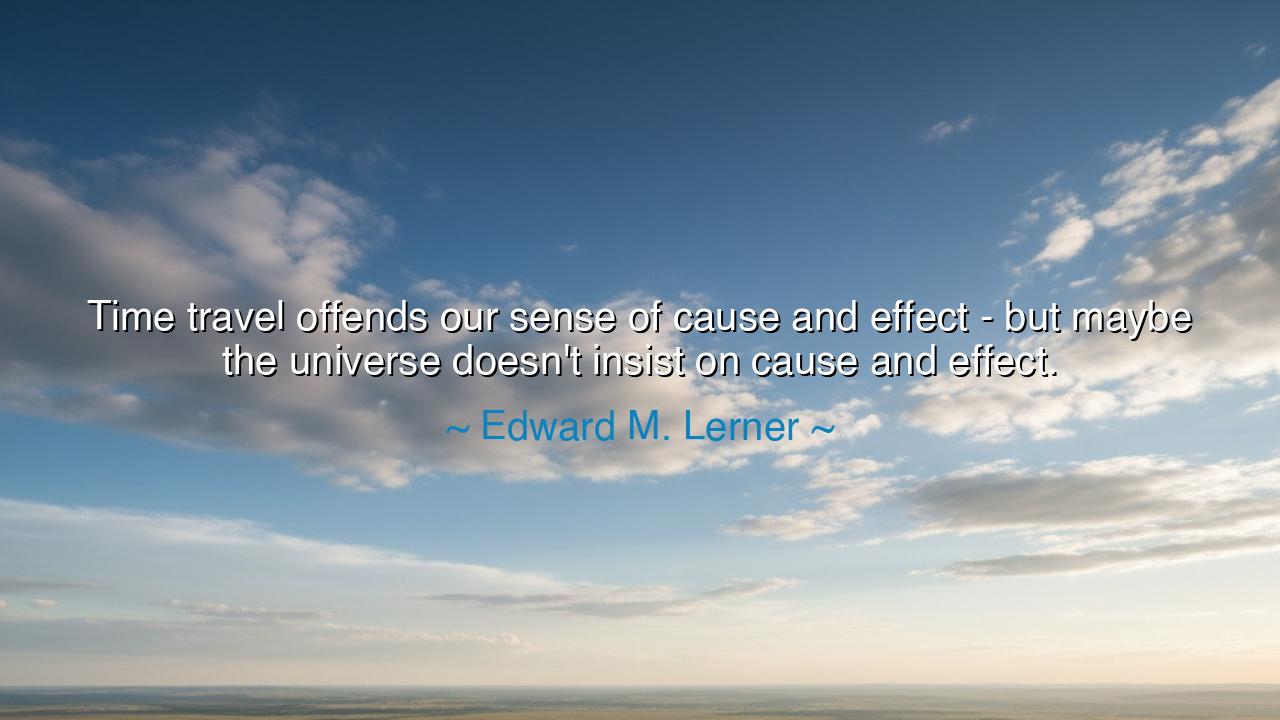
Time travel offends our sense of cause and effect - but maybe
Time travel offends our sense of cause and effect - but maybe the universe doesn't insist on cause and effect.






Hear, O seeker of mysteries, the words of Edward M. Lerner, who proclaimed: “Time travel offends our sense of cause and effect—but maybe the universe doesn’t insist on cause and effect.” These words pierce like a blade through the veil of certainty, reminding us that the laws we hold as sacred may themselves be but shadows, carved not by eternity but by the limits of our understanding.
For to the human mind, cause and effect is the bedrock of reason. We believe that the spark ignites the flame, that the seed becomes the tree, that the arrow loosed from the bow flies toward its mark. Without this chain of order, our world would dissolve into chaos. Yet Lerner dares to suggest that this chain is not eternal law, but mortal habit. What if the universe itself is not bound by this order? What if it dances to rhythms our minds cannot yet hear?
The thought of time travel troubles us precisely because it strikes at this foundation. If one could walk backward into yesterday, could the son meet his grandfather as a child? Could one alter the past, and thus erase the very present in which he stands? Such paradoxes unravel the tidy fabric of causality, and so our minds resist them. We are offended, not because they are impossible, but because they break the fragile patterns upon which we depend.
Yet history shows that what offends the common mind often hides deeper truth. Consider the tale of Copernicus and Galileo, who dared to suggest that the earth was not the center of all things. To their contemporaries, this idea was blasphemy, for it shattered the cause-and-effect chain that mankind had long believed—that the heavens circled us because we were the purpose of creation. Yet in time, their vision was revealed to be closer to the universe’s truth. So too may cause and effect be but a partial vision, a veil soon to be torn.
The meaning of Lerner’s words is not only scientific but spiritual. If cause and effect are not absolute, then life itself may be freer than we imagine. We are not bound solely by the rigid dictates of the past; perhaps the future is more open, more fluid, than our minds dare accept. In this lies both fear and liberation: fear, because it unsettles our logic; liberation, because it means destiny is not as fixed as we thought.
The lesson, O child of tomorrow, is this: hold your certainties lightly. Do not cling so tightly to your vision of order that you cannot see beyond it. Be ready to accept that the universe is vast and strange, greater than any law you write in your books. Question even the foundations of your reason, for progress is built not by those who worship the familiar, but by those who dare to ask, “What if it is otherwise?”
Practical action follows: live with curiosity. When you meet with paradox, do not turn away in fear, but gaze into it with wonder. When the world confuses you, remember that confusion is the threshold of discovery. Study, question, imagine, and embrace mystery, for in mystery lies growth. Just as the idea of the moving earth once shattered old certainties, so too will future revelations dismantle what we hold true today.
Therefore, remember Lerner’s wisdom: though time travel offends the mind, the universe itself may not be offended. The cosmos is not bound by our small logic. Walk humbly before its mysteries, and let your soul be bold enough to wonder, to dream, and to dwell in questions that may never be fully answered. For it is in the dwelling, not merely in the answering, that wisdom is found.






AAdministratorAdministrator
Welcome, honored guests. Please leave a comment, we will respond soon